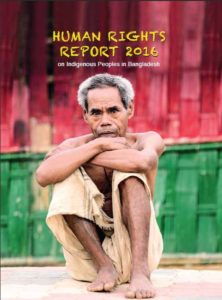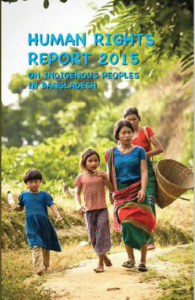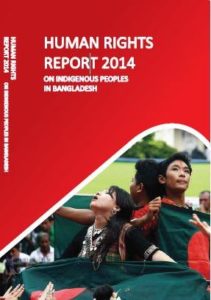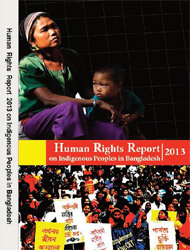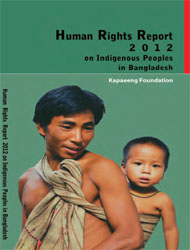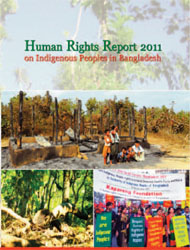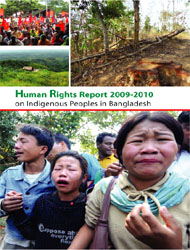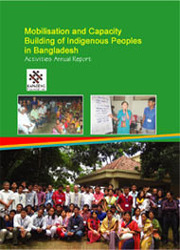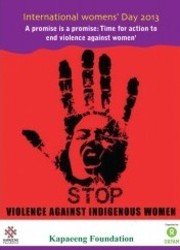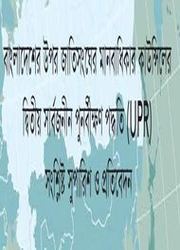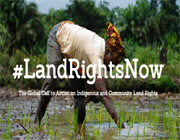IP Day 2016: United struggle of indigenous peoples will establish their right of self-determination, BIPF press conference told
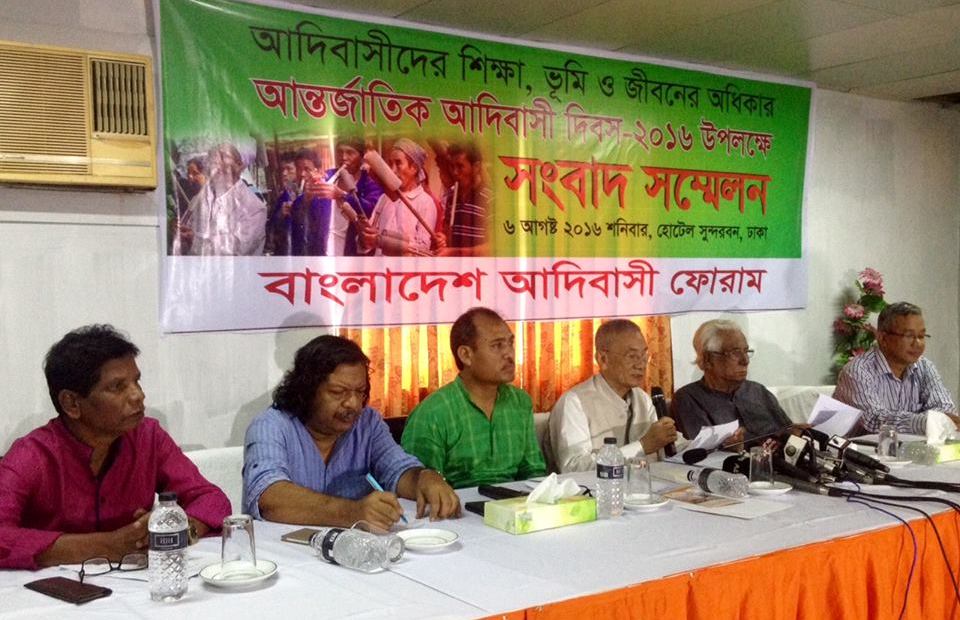
KF Report: Despite all the obstacles, indigenous peoples in the country are continuing with their struggle, in association with the democratic, liberal and progressive political and citizen forces of the country to establish their rights. Following the path of struggle indigenous peoples will achieve their right to self-determination someday. Expressing their commitment to strengthen their ongoing movement, the speakers of a press conference of Bangladesh Indigenous Peoples Forum (BIPF) uttered these words today.
Marking upcoming International Day of the World’s Indigenous Peoples 2016 on 9th August, BIPF organised the press conference at Hotel Sundarban in Dhaka. President of BIPF Mr. Jyotirindra Bodhipriya Larma (Santu Larma) delivered the statement of BIPF while General Secretary of BIPD conducted the press conference. Besides, eminent politician and human rights activist Pankaj Bhattacharya, Dhaka University teacher Prof. Mesbah Kamal, Organising Secretary of BIPF Shakti Pada Tripura, President of Jatiya Adivasi Parishad and Kapaeeng Foundation Rabindranath Soren, associate professor of Dhaka University Robaet Ferdous including central leaders of BIPF were present in the press conference.
Mr. Jyotirindra Bodhipirya Larma in his press statement said that indigenous peoples are leading their lives in a miserable state. As a result of age long historic exploitation and deprivation, indigenous peoples have been pushed to the margin. They are deprived of their civil, political, social, economic and cultural rights. They are lagging behind in the education sector including higher education. Hence there is an urgent need for implementation of the Education Policy 2010 that put emphasis on removing discrimination on the grounds of nationality, religion, ethnicity and sex. Indigenous children still do not have access to education in mother tongue.
Mr. Larma further mentioned that while land is life for indigenous peoples, a land grabbing spree is going on in connection with the lands of indigenous peoples across the country. The act of eviction is aided by disregarding the customary land management system of indigenous peoples, national laws and policies, including the CHT Accord in the CHT region and the East Bengal State Acquisition and Tenancy Act 1950 in the plains. The influential land grabbers are constantly grabbing the lands of indigenous peoples using forged land documents, terror, intimidation and loopholes in the law. In addition, indigenous peoples are losing their lands in the name of different projects undertaken by the government, such as national park, eco-park, reserved forest, social forestry, land leases, tourism centre and security camps. Often in connection to land, the rights violations of indigenous peoples remains incessant.
The government declared 9,145 acres of land as reserved forest at Madhupur under Tagail district which leads to uprooted thousands of indigenous Garo, Koch and Barman communities from their ancestral land. The government denied to return 1842.30 acres of land, acquired by the Rangpur (Mahimagonj) Sugar Mills, also known as Bagda Farm during the Pakistan period, to indigenous and marginalized Bengali farmers of 20 villages (including 15 indigenous villages) in Gaibandha district. Didtrict administration of Moulvibazar district issued eviction notice to indigenous Khasi villagers at Nahar Punjee under Sreemongal upazila. 65 families of indigenous Tripura community in Sajek under Baghaichari upazila and 31 families of Bawm community in Bogalake under Ruma upazila are under threat to eviction due to establishment of tourist centres by the army.
The CHT Accord signed in 1997 has completed its 18 years, but the core issues of the Accord relating to political and constitutional, economic and land rights, withdrawal of all temporary military camps including de facto military rule ‘Operation Uttoron’ and rehabilitation, were left out from being addressed. In consequence, the Special Administrative System embodying the CHT Regional Council and the three Hill District Councils could not be evolved narrowing eventually the scope for mass peoples’ participation in the management of administration as well as the chances for political and peaceful solution to the CHT crisis. The government continues to maintain absolute indifference and is extremely passive as far as the implementation process of the Accord is concerned. In fact, the implementation process of the CHT Accord is totally stalled.
As per report of Kapaeeng Foundation, in 2015, at least 74 members of indigenous communities including women and schoolgirls across the country were arrested charging with criminal offences. Recently, the local ruling Awami League leadership of Bandarban and Rangamati hill districts in collaboration with the local administration, police and security forces have been hatching various forms of conspiracy against and meting out repression and political intimidation upon PCJSS members. The repressive activities left 2 killed, 16 detained, 30 injured, filed false case at least against 50 and left more than 200 from their areas.
In the press conference, BIPF put forward following demand addressing the government for urgent action:-
- Take special measures to ensure the right to education. Make budgetary allocation for spreading education among indigenous peoples. Take initiatives to allow indigenous peoples to enjoy the benefits of the education policy.
- Take initiative for introducing special scholarships for indigenous students for their higher studies. Immediately implement the decision to introduce primary education in indigenous languages and for this purpose, immediately employ qualified indigenous teachers.
- Recognize and make the traditional and customary land rights of indigenous peoples. Make amendment to the constitution in order to provide recognition to the identity and rights of indigenous peoples.
- Immediately implement the CHT Accord fully and properly and declare a time-bound roadmap in this regard. Enforce the amended CHT Land Dispute Resolution Commission Act functional.
- Endorse and implement the United Nation Declaration on the Rights of Indigenous Peoples 2007. Implement ILO Convention No. 107 and Ratify and implement ILO Convention No. 169.
- Form an independent land commission for indigenous peoples of the plains in order to resolve their land disputes. Scrap the gazette declaring the Garo and Koch peoples’ Madhpur Garh as reserved forest.
- Enact the Bangladesh Indigenous Peoples Rights Act drafted by the Parliamentary Caucus on Indigenous Peoples.
- Ensure the land rights of indigenous Khasi people of Jhimai, Pallathal and Nahar punji and stop pressure from the administration on them and the lease of the tea estates should be cancelled.
- Stop communal attack, fabricated cases, harassment and propaganda against indigenous peoples. Ensure security of all citizens including indigenous women.
- Observe the IP Day formally by the State.
The press conference also declared the series of events to be organised by indigenous peoples’ organizations and like-minded civil society organizations and alliances over the next week marking the IP Day 2016.
- 7 August: Day-long workshop by the Parliamentary Caucus on Indigenous Peoples at CIRDAP Auditorium, Dhaka.
- 8 August: Candle light vigil and cultural program by Garo Students’ Association (GASU) and Khasi Students’ Association (KSU) at Central Saheed Minar, Dhaka.
- 9 August: Gathering, rally and cultural program (central IP Day event) by BIPF at Central Shaheed Minar, Dhaka.
- 10 August: Seminar on land rights of indigenous peoples by over 10 civil society organizations at CIRDAP Auditorium.
- Other than abovementioned events in Dhaka, the IP Day will be organised across different districts of the country including Rajshahi, Dinajpur, Natore, Thakurgaon, Mymensingh, Tangail, Gazipur, Netrokona, Sylhet, Moulvibazar, Sherpur, Rangamati, Bandarban, Khagrachari, Chittagong, Chandpur and Cox’s Bazar.
please click here to find the english version of the press statement
Published on 6 August 2015



